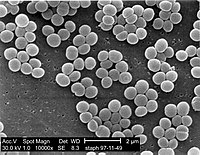
Photo from wikipedia
Staphylococcus pseudintermedius is an important opportunistic pathogen causing various infections in dogs. Furthermore, it is an emerging zoonotic agent and both multidrug-resistant methicillin-resistant S. pseudintermedius (MRSP) as well as methicillin-susceptible… Click to show full abstract
Staphylococcus pseudintermedius is an important opportunistic pathogen causing various infections in dogs. Furthermore, it is an emerging zoonotic agent and both multidrug-resistant methicillin-resistant S. pseudintermedius (MRSP) as well as methicillin-susceptible (MSSP) strains represent an important therapeutic challenge to veterinary medicine and pose a potential threat to human health. We tested representative S. pseudintermedius clinical strains from dogs suffering from otitis externa for their susceptibilities to a panel of 17 antimicrobials compared to DIBI. DIBI, unlike antibiotics, is a novel water-soluble hydroxypyridinone-containing iron-chelating agent that deprives microbes of growth-essential iron and has been previously shown to inhibit methicillin-resistant Staphylococcus aureus (MRSA). We also characterised the strains according to whether they harbour key antibiotic resistance genes. The strains each displayed multiple antimicrobial resistance patterns; all were negative for the mecA gene and possessed the tetK and tetM genes, but they varied as to their possession of the ermB gene. However, all the isolates had similar susceptibility to DIBI with low MICs (2 µg/mL or 0.2 µM). Because the four MSSPs were equally susceptible to DIBI, subject to confirmation with additional strains, this could provide a potential non-antibiotic, anti-infective alternative approach for the treatment of antimicrobial-resistant canine S. pseudintermedius otitis.
Journal Title: Pathogens
Year Published: 2022
Link to full text (if available)
Share on Social Media: Sign Up to like & get
recommendations!